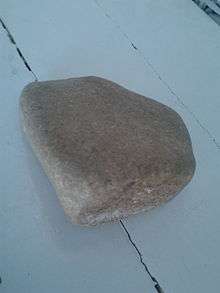Tayammum
| Part of a series on |
| Islamic jurisprudence (fiqh) |
|---|
| Islamic studies |

Tayammum (Arabic: تيمم) is the Islamic act of dry ablution using a purified sand or dust, which may be performed in place of ritual washing (wudu or ghusl) if no clean water is readily available or if one is suffering from moisture-induced skin inflammation or scaling.
"O you who believe! When you intend to offer As-Salat (the prayer), wash your faces and your hands (forearms) up to the elbows, rub (by passing wet hands over) your heads, and (wash) your feet up to ankles. If you are in a state of Janaba (i.e. after a sexual discharge), purify yourselves (bathe your whole body). But if you are ill or on a journey, or any of you comes after answering the call of nature, or you have been in contact with women (i.e. sexual intercourse), and you find no water, then perform tayammum with clean earth and rub therewith your faces and hands. Allah does not want to place you in difficulty, but He wants to purify you, and to complete His Favour to you that you may be thankful."
— Qur'an, Sura 5 (Al-Mai'da), ayat 6[1]
Circumstances when tayammum is not necessary
Tayammum may be substituted for wudu or ghusl when access to water is restricted or impractical, namely:[2]
- When sufficient amounts of water for ritual washing are not available, including when using the available water for wudu or ghusl would leave insufficient water for drinking.
- When obtaining water is hazardous or prohibitively expensive.
- When using water poses a health risk.
- When the water available is impure.
Clarifying the meaning of the verse
4:43 O you who acknowledge, do not come near the contact prayer while you are drunk, until you know what you are saying. Nor if you have had intercourse, unless traveling, until you bathe. If you are ill, or traveling, or one of you come from the bathroom, or you had sexual contact with the women, and could not find water: then you shall seek clean soil and wipe your faces and hands. God is Pardoning, Forgiving.[3]
Thus, in case of illness or travelling, even if there is water, one still does not need to wash.
Performing Tayammum
- Finding a piece of ground which is free of najaasah (unclean elements). This could be any surface that naturally collects dust like rock, sand or grass.
- Mentally make niyyah, or intention to make tayammum.
- Recite the bismillah.
- Place the hands on the surface of the ground.
- Lift your hands and ensure that there is no dust on your palm surface by hitting your hands together.
- Rub your face with both your hands. The face encompasses the right ear to the left, and the top of the forehead to the bottom of the chin
- Repeat steps 4 and 5.
- Rub your arms. Use your left hand to rub your right arm from the fingers to the elbow, and back along the inner arm to the hand. Do the same with the other arm using the right hand.
The same conditions that invalidate wudu also invalidate tayammum. In addition, a person's tayammum is invalidated as and when water becomes available. Tayammum is very important when water is not near.
Items on which Tayammum is permitted
Tayammum is permitted on all items which have thick dust on them, baked earthen pots (unglazed), clay, limestone And also ابخش stone, taahir (pure) earth, walls of mud, stone or brick.
Items on which Tayammum is not permitted
Tayammum is not permitted on: all items which burn to ash, dissolve, rot or melt; food items, glass, metal, trees, wood, dash.
References
Further reading
- Lemu, B. A. Islamic Aqidah and Fiqh: A textbook of Islamic Belief and Jurisprudence revised and expanded edition of Tawhid and Fiqh), IQRA' International Educational Foundation, Chicago, 1997.
